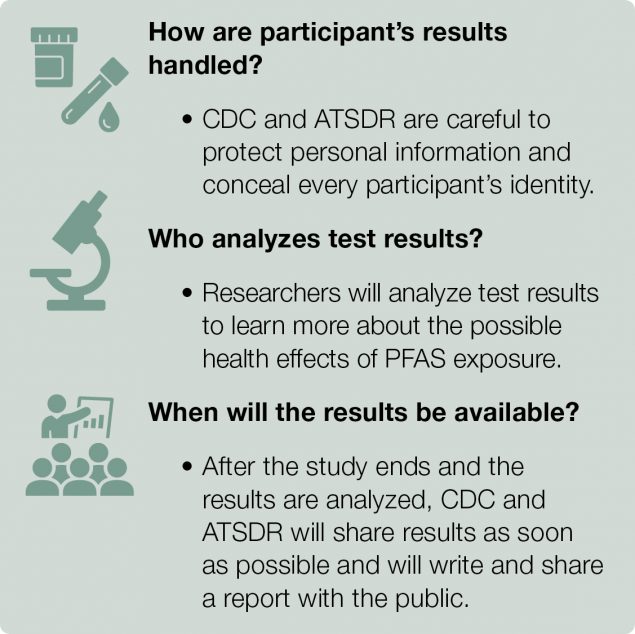Pease Study Community Fact Sheet

Information to Protect our Communities
The Centers for Disease Control and Prevention (CDC) and the Agency for Toxic Substances and Disease Registry (ATSDR) are studying the health effects from drinking PFAS (per- and polyfluoroalkyl substances)-contaminated water in the Portsmouth, New Hampshire area.
- In April and May 2014, tests found PFAS in drinking water from Pease International Tradeport Public Water System (PWS).
- You may be able to participate in the study if you live in or near Portsmouth, NH and meet eligibility criteria.
Phone: Pease Study call center at 603-846-6192 (for eligibility)
Email PeaseStudy@cdc.gov.
Visit www.atsdr.cdc.gov/pfas/Pease-Study.html.
Call CDC/ATSDR at 1-800-CDC-INFO (232-4636).
Why are CDC and ATSDR doing a study on PFAS in Portsmouth and the surrounding areas?
Portsmouth, New Hampshire and the surrounding areas were selected for the study because residents were exposed to drinking water that contained PFAS.
CDC and ATSDR are recruiting participants for a study to evaluate their PFAS blood levels, health measures like cholesterol levels and thyroid function, and medical history to learn how PFAS may affect health.
CDC and ATSDR want to understand more about PFAS human health effects since little is known and because some studies have shown that PFAS may harm human health.
Who may be eligible for the health study?
Pease Study eligibility requires meeting the following criteria:
An adult aged 18 or older who
- worked or attended school at Pease International Tradeport at anytime from January 2004 to May 2014, or
- lived in Newington at anytime from January 2004 to the present and used a private well with documented PFAS contamination.
A child aged 4 through 17 who has parent or guardian permission and
- attended daycare at Pease International Tradeport at anytime from January 2004 to May 2014, or
- was born to and/or breastfed by a mother who meets the adult eligibility criteria.
A small group of adults who never drank water from Pease International Tradeport and whose occupation or education did not expose them to PFAS, and children who never drank water from Pease International Tradeport may also be eligible to participate.
PFAS are human-made chemicals used since the 1940s in a variety of products, including some cosmetics; water, grease, and oil-resistant products; and firefighting foam.
Research involving humans suggests that high levels of certain PFAS may lead to the following:
- Increased cholesterol levels
- Changes in liver enzymes
- Decreased vaccine response in children
- Increased risk of high blood pressure or pre-eclampsia in pregnant women
- Small decreases in infant birth weights
- Increased risk of kidney or testicular cancer
How did PFAS get into drinking water?
PFAS containing aqueous film-forming foam (AFFF) may have gotten into public and private wells during firefighting and firefighting training on the former Pease Air Force Base. When the City of Portsmouth learned of PFAS water contamination, it closed the most contaminated well supplying the Pease Tradeport drinking water system May 2014.
What types of tests will Pease Study researchers do?
Trained health professionals will be
- Testing blood and urine samples;
- Taking body measurements;
- Asking about medical history; and
- Studying behaviors in child participants.

What are some benefits to Pease Study participants?
Participants will
- Help scientists understand how PFAS affect health.
- Receive their individual test results, which they can share with their doctors to monitor their health.
- Receive up to $75 in gift cards for completing the entire study.